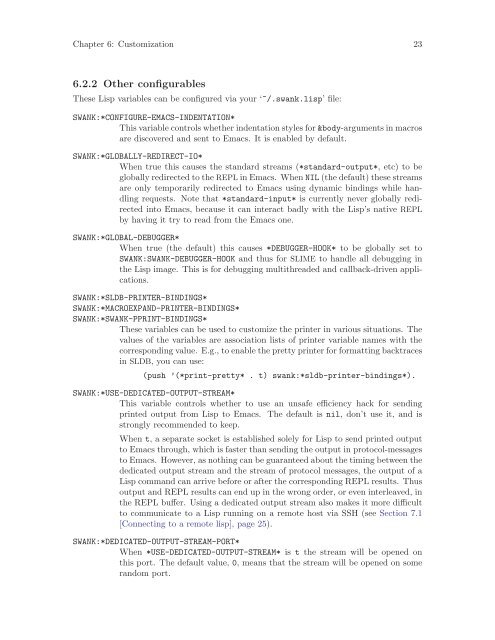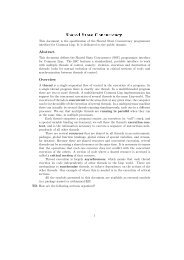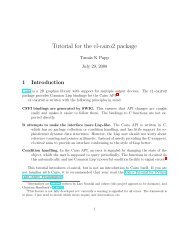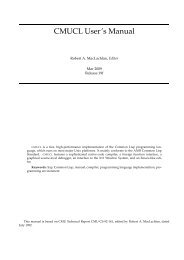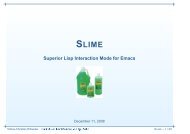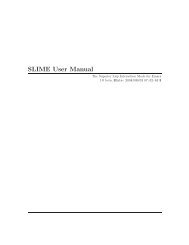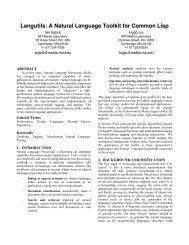SLIME User Manual version 3.0-alpha - Common Lisp
SLIME User Manual version 3.0-alpha - Common Lisp
SLIME User Manual version 3.0-alpha - Common Lisp
Create successful ePaper yourself
Turn your PDF publications into a flip-book with our unique Google optimized e-Paper software.
Chapter 6: Customization 23<br />
6.2.2 Other configurables<br />
These <strong>Lisp</strong> variables can be configured via your ‘~/.swank.lisp’ file:<br />
SWANK:*CONFIGURE-EMACS-INDENTATION*<br />
This variable controls whether indentation styles for &body-arguments in macros<br />
are discovered and sent to Emacs. It is enabled by default.<br />
SWANK:*GLOBALLY-REDIRECT-IO*<br />
When true this causes the standard streams (*standard-output*, etc) to be<br />
globally redirected to the REPL in Emacs. When NIL (the default) these streams<br />
are only temporarily redirected to Emacs using dynamic bindings while handling<br />
requests. Note that *standard-input* is currently never globally redirected<br />
into Emacs, because it can interact badly with the <strong>Lisp</strong>’s native REPL<br />
by having it try to read from the Emacs one.<br />
SWANK:*GLOBAL-DEBUGGER*<br />
When true (the default) this causes *DEBUGGER-HOOK* to be globally set to<br />
SWANK:SWANK-DEBUGGER-HOOK and thus for <strong>SLIME</strong> to handle all debugging in<br />
the <strong>Lisp</strong> image. This is for debugging multithreaded and callback-driven applications.<br />
SWANK:*SLDB-PRINTER-BINDINGS*<br />
SWANK:*MACROEXPAND-PRINTER-BINDINGS*<br />
SWANK:*SWANK-PPRINT-BINDINGS*<br />
These variables can be used to customize the printer in various situations. The<br />
values of the variables are association lists of printer variable names with the<br />
corresponding value. E.g., to enable the pretty printer for formatting backtraces<br />
in SLDB, you can use:<br />
(push ’(*print-pretty* . t) swank:*sldb-printer-bindings*).<br />
SWANK:*USE-DEDICATED-OUTPUT-STREAM*<br />
This variable controls whether to use an unsafe efficiency hack for sending<br />
printed output from <strong>Lisp</strong> to Emacs. The default is nil, don’t use it, and is<br />
strongly recommended to keep.<br />
When t, a separate socket is established solely for <strong>Lisp</strong> to send printed output<br />
to Emacs through, which is faster than sending the output in protocol-messages<br />
to Emacs. However, as nothing can be guaranteed about the timing between the<br />
dedicated output stream and the stream of protocol messages, the output of a<br />
<strong>Lisp</strong> command can arrive before or after the corresponding REPL results. Thus<br />
output and REPL results can end up in the wrong order, or even interleaved, in<br />
the REPL buffer. Using a dedicated output stream also makes it more difficult<br />
to communicate to a <strong>Lisp</strong> running on a remote host via SSH (see Section 7.1<br />
[Connecting to a remote lisp], page 25).<br />
SWANK:*DEDICATED-OUTPUT-STREAM-PORT*<br />
When *USE-DEDICATED-OUTPUT-STREAM* is t the stream will be opened on<br />
this port. The default value, 0, means that the stream will be opened on some<br />
random port.


